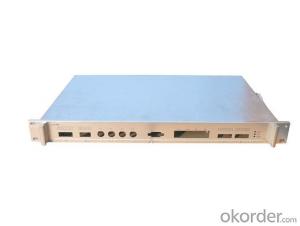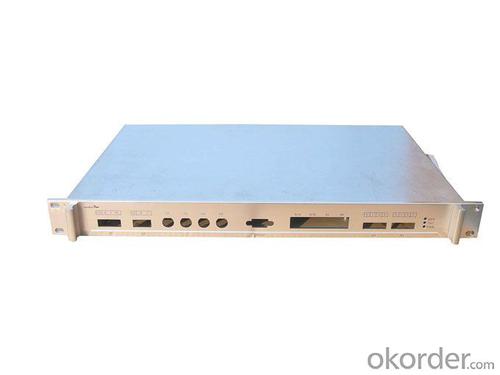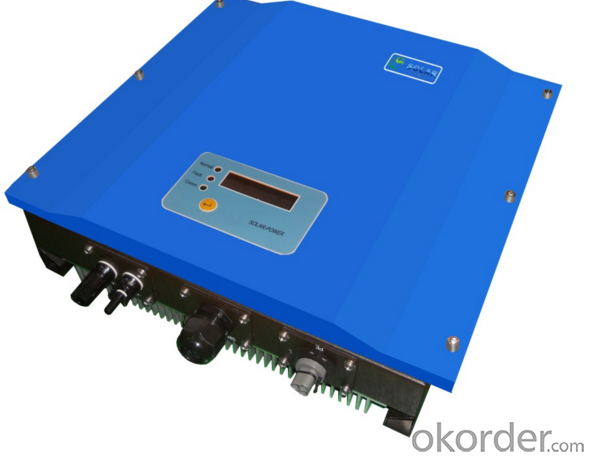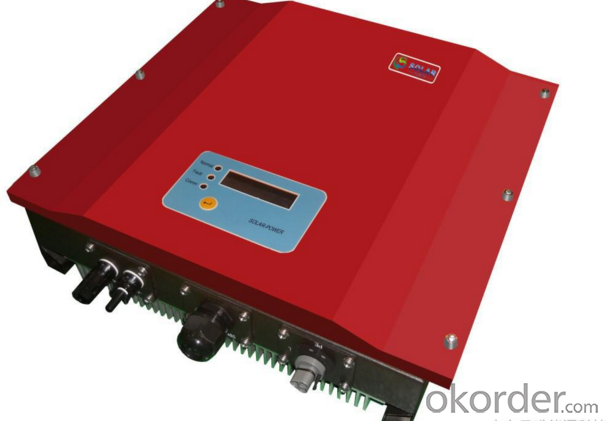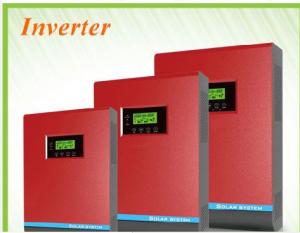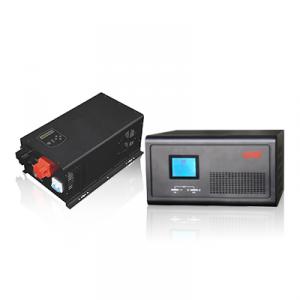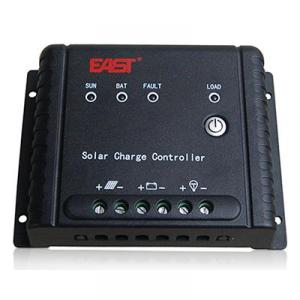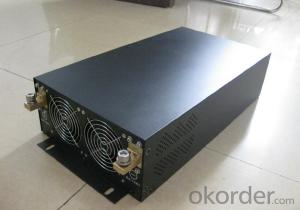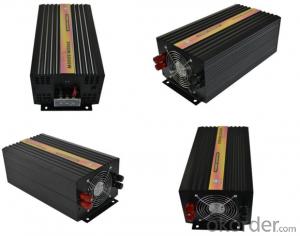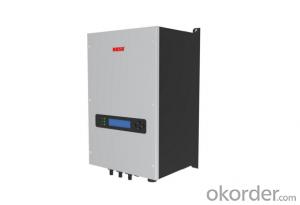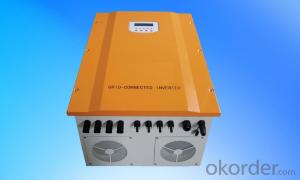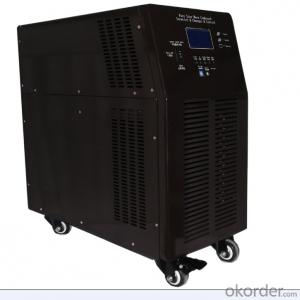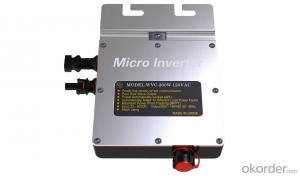Rich Solar Inverter - Single Phase Inverter Second Generation 4k Solar Inverter Made in China
- Loading Port:
- Shanghai
- Payment Terms:
- TT OR LC
- Min Order Qty:
- 0 watt
- Supply Capability:
- 10000 watt/month
OKorder Service Pledge
OKorder Financial Service
You Might Also Like
Description of Single Phase Inverter Second Generation 4k Solar Inverter
Solar ac power system consists of solar panels, charge controllers, inverter and battery; Solar energy does not include inverter dc power system. Inverter is a kind of power conversion device, inverter by incentives can be divided into self-excited oscillation inverter and separately excited oscillation inverter.
Features of Single Phase Inverter Second Generation 4k Solar Inverter
Standard 10 years warranty, 5-15 years optional
Built-in Gprs as option
Built-in Wifi as option
Smaller and lighter, only 9.6kg
High performance DSP for algorithm control
VDE-AR-N 4105 certification
New topology design
Dual MPPT design
Multi-button touch interface
LCD screen visible at night
Have anti-shading function
Advantages of Single Phase Inverter Second Generation 4k Solar Inverter
Longer life cycle
Plug and play
Free monitoring through our webportal
Very lower internal temperature
Easy transportation and installation
Faster CPU speed
Adjustable active and reactive power
Maximum conversion effciency up to 97.7%,Euro up to 96.9%
Real-time data readable at night
User friendly operation
Technical Data of Single Phase Inverter Second Generation 4k Solar Inverter
| Type | Omniksol-4k-TL2 |
| Input(DC) | |
| Max.PV Power | 4500W |
| Max,DC Voltage | 590V |
| Nominal DC Voltage | 360V |
| Operating MPPT Voltage Range | 120-550V |
| MPPT Voltage Range at Nominal Power | 150-500V |
| Start up DC Voltage | 150V |
| Turn off DC Voltage | 120V |
| Max, DC Current | 12A |
| Max, Short Cicuit Current for each MPPT | 16A |
| Number of MPP trackers | 2 |
| Max.Input Power for each MPPT | 2600W |
| Number of DC Connection for each MPPT | A:1/B:1 |
| DC Connection Type | MC4 connector |
| Output(AC) | |
| Max,AC Apparent Power | 4400VA |
| Nominal AC Power (cos phi = 1) | 4000W |
| Nominal Grid Voltage | 220V/230V/240V |
| Nominal Grid Frequency | 50Hz/60Hz |
| Max, AC Current | 19.0A |
| Grid Voltage Range** | 185-276V |
| Grid Frequency Range** | 45-55Hz/55-65Hz |
| Power Factor | 0.9 capacitive... 0.9 inductive |
| Total Harmonic Distortion(THD) | <2% |
| Feed in Starting Power | 30W |
| Night time Power Consumption | <1W |
| Standby Consumption | 6W |
| AC Connection Type | Plug-in connertor |
| Efficiency | |
| Max,Efficiency | 98.2% |
| Euro Efficiency | 97.5% |
| MPPT Efficiency | 99.9% |
| Safety and Protection | |
| DC Insulation Monitoring | Yes |
| DC Switch | Optional |
| Residual Current Monitoring Unit (RCMU) | Integrated |
| Grid Monitoring with Anti-islanding | Yes |
| Electricity Fuse Protection | Yes |
| Protection Class | Ⅰ(According to IEC 62103) |
| Overvoltage Category | PVⅡ/Mains Ⅲ(According to IEC 62109-1) |
| Reference Standard | |
| Safety Standard | EN 62109, AS/NZS 3100 |
| EMC Standard | EN 6100-6-1, EN 6100-6-2, EN 6100-6-3 EN 6100-6-4, EN 6100-3-2, EN 6100-3-3 |
| Grid Standard | VDE-AR-N4105. VDE-0126-1-1,G83/1,EN 50438,RD1699,CEI 0-21, AS4777,C10/C11 |
| Physical Structure | |
| Dimensions | 352x421x162.5mm |
| Weight | 16.5kg |
| Environmental Protection Rating | IP 65 (According to IEC 60529) |
| Cooling Concept | Internal fan convection |
| Mounting Information | Wall bracket |
| General Data | |
| Operating Temperature Range | -25℃ to +60℃(derating above 45℃) |
| Relative Humidity | 0% to 98%, no condensation |
| Max. Altitude (above sea level) | 2000m |
| Noise Type | <40dB |
| Isolation Type | Transformerless |
| Display | 3 LED ,Backlight, 4x20 Character LCD |
| Data Communication | RS485(WiFi, GRPS integrated) |
| Computer Communication | USB |
| Standard Warranty | 10 Years (5-15 years optional) |
IMages of Single Phase Inverter Second Generation 4k Solar Inverter
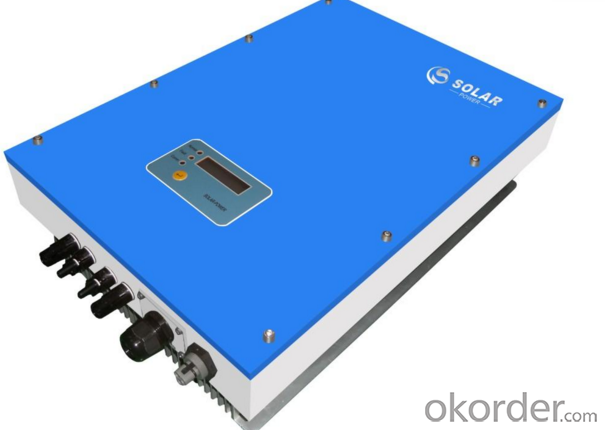
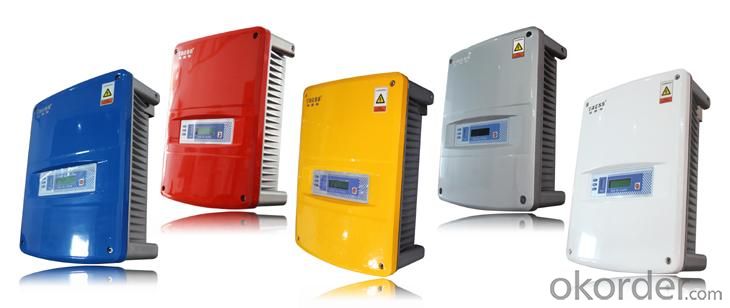
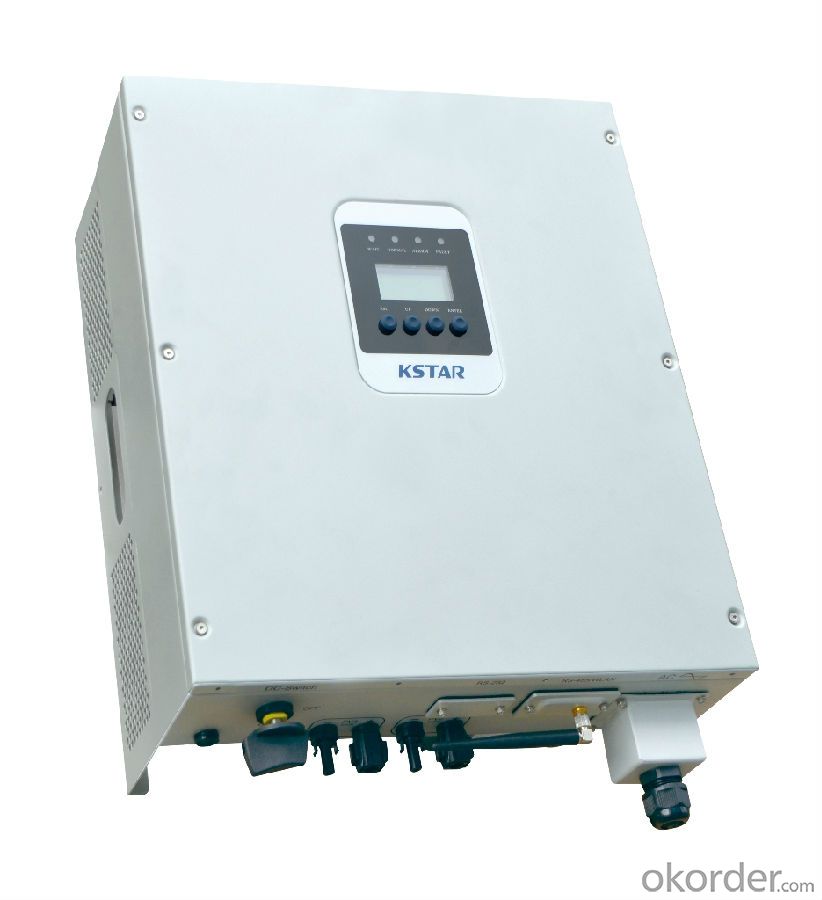
FAQ
Q: Do you have the CE, TUV, UL Certification?
A: We’ve already passed all the tests, and any certificate is available.
Q: Have you ever sold your products to companies in my country?
A: Of course, we have customers in all general PV markets, but I think we should expand our market share along with the market growth.
Q: When did your company set up? You are a new company, how can I believe your quality?
A: We entered into Solar PV industry in 2005, now we have several plants in manufacturing of a-Si and c-Si panels, and our capacity is 220MW per year. Till now we have already passed all the tests by authorized laboratories, e.g. TUV, CE, UL.
Q: Can you help us install the module if we cooperate with you?
A: We haven’t entered into installation sector, but we have the plan in near future.
Q: How do you pack your products?
A: We have rich experience on how to pack the panels to make sure the safety on shipment when it arrives at the destination.
Q: Can you do OEM for us?
A: Yes, we can.
Q: Can we visit your factory?
A: Surely, I will arrange the trip basing on your business schedule.
- Q: How does a solar inverter handle variations in battery charge levels?
- A solar inverter manages variations in battery charge levels by continuously monitoring the battery voltage and adjusting the charging and discharging rates accordingly. It optimizes the power flow and ensures that the battery is neither overcharged nor depleted, thus maximizing its lifespan and efficiency.
- Q: What is the role of a solar inverter in a solar-powered ventilation system?
- The role of a solar inverter in a solar-powered ventilation system is to convert the direct current (DC) generated by solar panels into alternating current (AC) that can be used to power the ventilation system. It ensures that the electricity generated by the solar panels is compatible with the system's requirements and can efficiently operate the ventilation components.
- Q: Can a solar inverter be used with a smart home automation system?
- Certainly! A smart home automation system can indeed work together with a solar inverter. Nowadays, many solar inverters come with communication capabilities built-in, like Wi-Fi or Ethernet connectivity. This means that they can easily be integrated into a smart home automation system. This integration allows homeowners to remotely monitor and control their solar power production and usage using a smartphone app or a central control panel. By having a smart home automation system, users can keep track of real-time energy generation, make adjustments to settings, and receive notifications about system performance or any potential issues. This integration not only enhances the convenience and efficiency of managing solar power but also enables better optimization and synchronization with other smart devices and appliances in the household.
- Q: How does a solar inverter protect against power surges?
- A solar inverter protects against power surges by using built-in surge protection devices such as metal oxide varistors (MOVs) or transient voltage suppressors (TVS). These devices act as a barrier, diverting excess voltage from entering the inverter and the connected solar panels. This prevents damage to the inverter and other sensitive electronic components by ensuring that the voltage stays within safe limits.
- Q: What are the different power output modes of a solar inverter?
- The different power output modes of a solar inverter typically include grid-tie mode, off-grid mode, and hybrid mode. In grid-tie mode, the solar inverter synchronizes with the utility grid, allowing excess solar energy to be fed back into the grid. Off-grid mode, on the other hand, enables the solar inverter to operate independently, providing power to appliances and devices without the need for a utility grid connection. Hybrid mode combines the features of both grid-tie and off-grid modes, allowing the solar inverter to function with or without the grid, depending on the availability of solar energy and the user's preferences.
- Q: How do you calculate the maximum power point tracking efficiency for a solar inverter?
- To calculate the maximum power point tracking (MPPT) efficiency for a solar inverter, you need to compare the actual power output of the inverter with the maximum power point (MPP) of the solar panel. It can be calculated by dividing the actual power output by the MPP power and then multiplying the result by 100 to get the efficiency in percentage. The formula is: MPPT efficiency = (Actual Power Output / MPP Power) * 100.
- Q: Can a solar inverter be used for off-grid applications?
- Yes, a solar inverter can be used for off-grid applications. Off-grid systems typically rely on solar panels to generate electricity, and a solar inverter is essential in converting the direct current (DC) generated by the panels into alternating current (AC) which can be used to power various appliances and devices. The inverter also manages the flow of electricity, ensures system stability, and may include features like battery charging and energy storage capabilities, making it suitable for off-grid applications where no grid connection is available.
- Q: What is the role of a solar inverter in a battery storage system?
- The role of a solar inverter in a battery storage system is to convert the direct current (DC) electricity produced by the solar panels into alternating current (AC) electricity that can be used to power household appliances and charge the battery. It also manages the flow of electricity between the solar panels, battery, and the grid, ensuring optimal utilization of the stored energy and facilitating grid interaction when necessary.
- Q: What is the role of ground fault protection in a solar inverter?
- The role of ground fault protection in a solar inverter is to detect and mitigate any potential faults or abnormalities in the system's grounding. It ensures the safety of the system and personnel by quickly identifying and isolating ground faults, preventing electrical shock hazards and damage to the equipment.
- Q: How does a solar inverter synchronize with the electrical grid?
- A solar inverter synchronizes with the electrical grid by constantly monitoring the grid's voltage and frequency. It adjusts its own output voltage and frequency to match those of the grid, ensuring seamless integration and safe operation. This synchronization process allows the solar inverter to feed power into the grid and maintain grid stability.
Send your message to us
Rich Solar Inverter - Single Phase Inverter Second Generation 4k Solar Inverter Made in China
- Loading Port:
- Shanghai
- Payment Terms:
- TT OR LC
- Min Order Qty:
- 0 watt
- Supply Capability:
- 10000 watt/month
OKorder Service Pledge
OKorder Financial Service
Similar products
Hot products
Hot Searches
Related keywords
